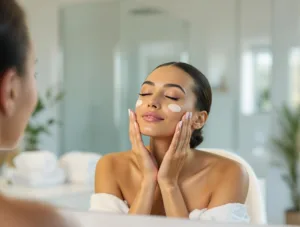The Ultimate Guide to an Evening Skincare Routine for Radiant Morning Skin
Introduction
Achieving glowing, healthy skin is not just about genetics—it’s about consistency, the right products, and a well-structured skincare routine. While morning skincare focuses on protection (like SPF and antioxidants), nighttime is when your skin undergoes repair and regeneration. A proper evening skincare routine can make the difference between dull, tired skin and a radiant, youthful complexion by morning.
This comprehensive guide will walk you through the essential steps of an effective nighttime skincare regimen, explaining why each step matters and how to tailor it to your skin type. Whether you’re dealing with dryness, acne, aging, or sensitivity, this article will provide expert-backed advice to help you wake up to fresher, brighter skin every day.
Why an Evening Skincare Routine is Essential
During the day, your skin battles environmental aggressors like pollution, UV rays, and free radicals. At night, while you sleep, your skin shifts into repair mode—cell turnover increases, collagen production ramps up, and moisture is replenished. A well-planned nighttime routine enhances these natural processes, ensuring your skin recovers optimally.
Neglecting your evening skincare can lead to clogged pores, accelerated aging, and lackluster skin. Conversely, a disciplined routine can help:
- Remove impurities accumulated throughout the day
- Boost hydration and barrier function
- Stimulate collagen production
- Reduce fine lines and hyperpigmentation
Step-by-Step Evening Skincare Routine
1. Double Cleansing: The Foundation of Clear Skin
Why it matters: Even if you don’t wear makeup, sunscreen, sweat, and pollutants build up on your skin. A single cleanse may not remove everything, leading to clogged pores and breakouts.
How to do it:
- First cleanse: Use an oil-based cleanser or micellar water to dissolve makeup, sunscreen, and sebum.
- Second cleanse: Follow with a gentle water-based cleanser (foaming, gel, or cream) to remove residual impurities.
Best for:
- Oily/acne-prone skin: Gel cleanser with salicylic acid
- Dry/sensitive skin: Cream or milky cleanser with ceramides
2. Exfoliation (2-3 Times a Week)
Why it matters: Exfoliation removes dead skin cells, unclogs pores, and enhances product absorption. Over-exfoliating can damage the skin barrier, so moderation is key.
Types of exfoliants:
- Chemical exfoliants (AHAs/BHAs): Glycolic acid (for brightness), lactic acid (for hydration), salicylic acid (for acne).
- Physical exfoliants: Gentle scrubs (avoid harsh grains).
Pro tip: Never combine strong exfoliants with retinoids to prevent irritation.
3. Tone for Balanced Skin
Why it matters: Toners restore pH balance, hydrate, and prep skin for serums. Avoid alcohol-heavy toners, which can be drying.
Best toners for different concerns:
- Hydration: Hyaluronic acid-based toners
- Acne: Witch hazel or tea tree-infused toners
- Brightening: Vitamin C or niacinamide toners
4. Treatment Serums: Targeted Solutions
Why it matters: Serums contain concentrated active ingredients to address specific concerns.
Popular options:
- Hyaluronic acid: Deep hydration
- Vitamin C: Brightening and antioxidant protection
- Retinol: Anti-aging, boosts collagen
- Niacinamide: Reduces redness and pores
Application tip: Apply thinnest to thickest consistency.
5. Eye Cream: Prevent Fine Lines
Why it matters: The eye area is delicate and prone to wrinkles and puffiness.
Key ingredients to look for:
- Caffeine (reduces puffiness)
- Peptides (stimulate collagen)
- Ceramides (hydrate and protect)
How to apply: Gently dab with the ring finger to avoid tugging.
6. Moisturize to Lock in Hydration
Why it matters: Nighttime is when skin loses the most moisture. A good moisturizer strengthens the skin barrier.
Best moisturizers by skin type:
- Dry skin: Thick creams with shea butter or squalane
- Oily skin: Lightweight gel moisturizers
- Combination skin: Balanced lotions with hyaluronic acid
7. Face Oil (Optional for Extra Nourishment)
Why it matters: Oils seal in moisture and provide additional nutrients.
Best oils for different needs:
- Dry skin: Argan oil, rosehip oil
- Acne-prone skin: Jojoba oil (balances sebum)
- Aging skin: Marula oil (rich in antioxidants)
Application tip: Press, don’t rub, into the skin.
8. Lip Care: Don’t Forget Your Pout
Why it matters: Lips lose moisture quickly, leading to chapping.
Nighttime lip treatment: Apply a thick balm with lanolin or shea butter.
Additional Tips for Enhanced Results
- Sleep on a silk pillowcase: Reduces friction and prevents wrinkles.
- Use a humidifier: Adds moisture to the air, benefiting dry skin.
- Stay hydrated: Drink water to support skin repair.
- Avoid heavy meals before bed: Can cause puffiness.
Final Summary: Wake Up to Radiant Skin
A disciplined evening skincare routine is the secret to waking up with refreshed, glowing skin. By following these steps—double cleansing, exfoliating (sparingly), applying targeted treatments, and locking in moisture—you allow your skin to repair and rejuvenate overnight.
Final advice: Consistency is key. Stick to your routine for at least four weeks to see noticeable improvements. Adjust products based on your skin’s changing needs, and always listen to your skin—if something causes irritation, scale back.
With the right regimen, you’ll notice softer, clearer, and more radiant skin every morning. Sweet dreams and happy skincare!









Add comment